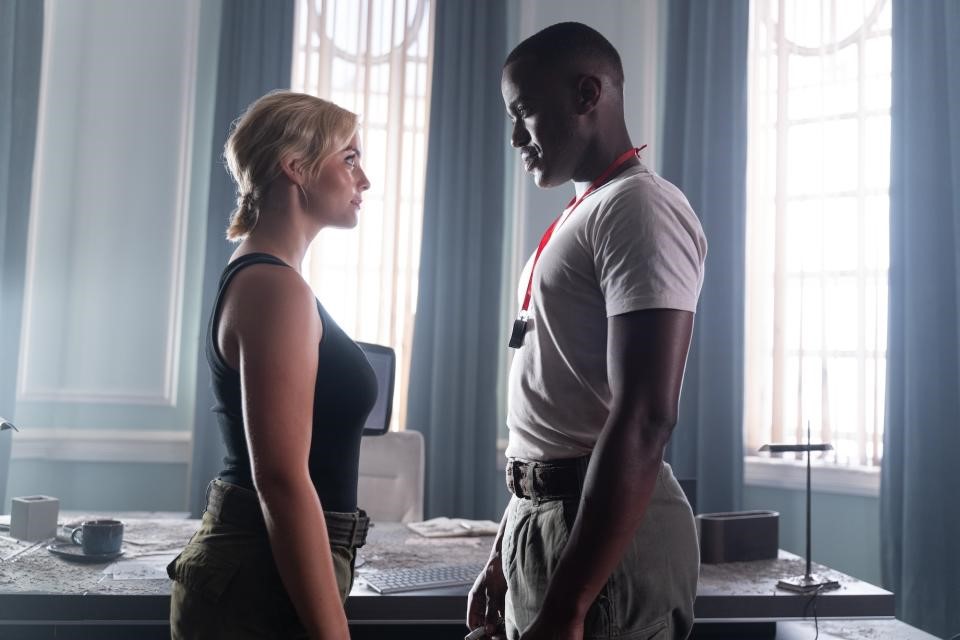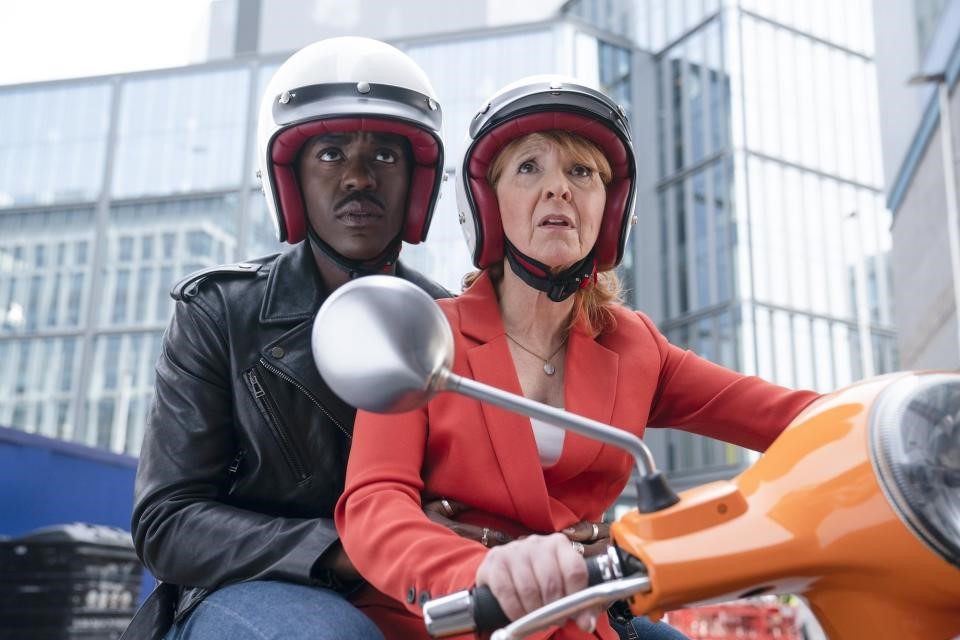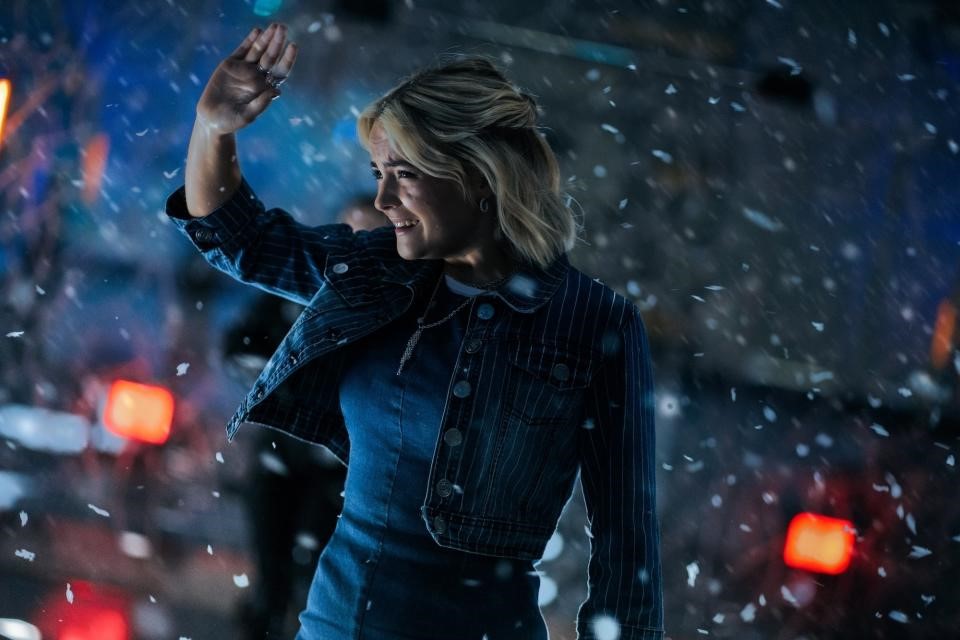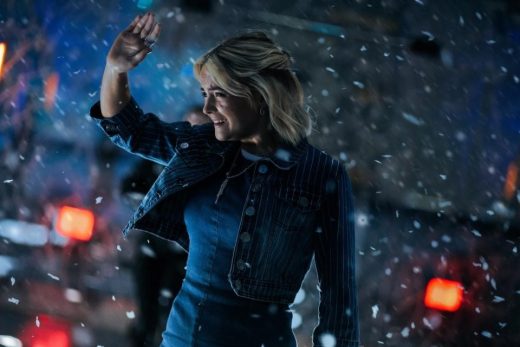Doctor Who: Empire of Death review: Take your dog for a walk
Doctor Who: Empire of Death review: Take your dog for a walk
Emotional bombast triumphs over internal consistency.

The following contains spoilers for “Empire of Death.”
“Empire of Death” is the typical Russell T. Davies series finale: It’s bombastic, dense and totally uninterested in resolving its own story. The episode bounces around for the requisite amount of time before leaping to its climax with an arresting visual of little substance. Because what Davies is really interested in is the scenes afterward, and the all-too-brief moment where Ruby Sunday gets coffee.

At the end of “The Legend of Ruby Sunday,” the Doctor (Ncuti Gatwa) and (classic-series companion) Mel (Bonnie Langford) are face to face with Sutekh’s minion (Susan Twist). Sutekh begins spraying its dust of death, a cloud of dust that turns whoever it touches into a pile of dust themselves. The Doctor and Mel outrun the cloud on Mel’s scooter in an action sequence that feels like it ate the bulk of the episode’s budget.
The pair head back to UNIT HQ to reunite with Ruby at the time window. Sutekh’s dog form is still clutching the TARDIS as a prized possession and wipes out the rest of the UNIT staff, including Kate (Jemma Redgrave), Rose (Yasmin Finney) and Morris (Lenny Rush). (Three deaths you just know won’t last for longer than half an hour.)
Sutekh explains to the Doctor he clung to the TARDIS (at some point) and followed it around on every step of the Doctor’s journey. Every planet the Doctor landed on, he planted a Susan Twist character there, each one lingering both as a trap for the Doctor and to sow Sutekh’s murderous dust. And he used the TARDIS’ perception filter to hide what he was doing. Did you know the filter operates at a distance of 73 yards? It’s a callback!
The Doctor, Ruby and Mel hightail it into the memory window’s TARDIS, which turns out to be the Memory TARDIS (which is just a regular TARDIS). This was a small, cobbled-together set from the 60th anniversary framing series Tales of the TARDIS, in which classic series actors introduced classic series episodes to new viewers. While in flight, the trio see what Sutekh has done to the universe, rendering it cold and empty, and giving Ncuti Gatwa a chance to scream his frustration into the literal void.
It’s now very important to uncover the identity of Ruby Sunday’s mother, especially given that Sutekh is interested in the answer. The trio take the Memory TARDIS on one final voyage to the dystopian future as shown in “73 Yards.” That’s where evil prime minister Roger ap Gwillam has instituted compulsory DNA testing to ensure the UK is a racially-pure nation. (Yes, it is a bit yikes.) But it’ll also give the Doctor the chance to identify who Ruby’s mother is from the records.
Once the information is on screen, they’re all pulled back to UNIT HQ in 2024 by Sutekh who is similarly curious. Sutekh uses his power to pull the Doctor to the floor, threatening his life, unless Ruby shares the information held on the gizmo she’s holding. But as she gets close to the pooch, she smashes the screen with the data on it and clips a piece of smart rope to Sutekh’s collar to ensnare him.
The Doctor then whistles for the TARDIS to come back to him, where he and Ruby clip the other end of the lead to the console and dematerialize. They then take this giant, evil alien dog on a walk through the time vortex which, uh, ah, something something brings everyone back to life. Try not to think too hard about it and enjoy the arresting visual of the TARDIS dragging a giant evil dog through some nice CGI.
There’s then some words about the Doctor having to become a killer in order to stop Sutekh killing. He casts Sutekh into the vortex. Given that’s what he did last time, I’m not sure why it’s more successful now but, as I said, coherence was never the focus of the episode.
Back at UNIT HQ, with everyone revived and eating pizza, they’re able to track down Ruby’s mother. She got pregnant at 15 and gave her daughter up to avoid the reprisals from some sinister stepfather who may have harmed the child. But she never sought to track down her daughter afterward, and didn’t even tell the father of the child that she’d had a baby. As for why Sutekh was interested in Ruby’s mother, the Doctor says it’s because people had invested time and emotion into her. Which feels like Davies chiding the audience for focusing on questions he himself laced into the series for this purpose.
And while I can see what Davies was trying to say, it’s not as if he’s played fair here – pointing a neon sign at Ruby saying that she was important. We don’t know why she can bend reality to her will, or make it snow whenever she thinks about her abandonment. We didn’t obsess over this question because we apply meaning to meaningless things, but because the show and its characters ascribed meaning to them.
The Doctor and Ruby stand outside a coffee shop where Ruby’s mother is now sitting, drinking and staring at her phone. The Doctor suggests that, since her mother never cared enough to look for her, she isn’t interested in connecting. But Ruby is undeterred and walks in, orders a coffee and sits on a big bench across from her mother, so that when the waiter calls her name, her mother looks up.
From there, we see the Sundays catching up. But for all the wonders of the universe the Doctor wishes to see, this apparently joyful reunion isn’t one of them, choosing to leave Ruby there. He says they’ll meet again but, given he left his own granddaughter, it’s just as likely he’ll forget all about her.
And so the TARDIS sets off for pastures new.

I don’t think “Empire of Death” paid off the previous episodes with any degree of satisfaction but I never expected it to, either. Davies’s modus operandi is to ignore the mechanics of storytelling in favor of vibes and those brief moments of touching character drama. The whole giant dog in space is weightless compared to the scene where Ruby sits across from her mother. Ironically, it was here that we should have dragged things out — the anticipation of if she would speak up would have been a better use of the show’s time than a lot of what happened last week.
But the ending did make me wonder about who in this world gets the privilege of a happy ending. Davies nearly died of a drug overdose in the mid ‘90s and then lost his partner to a brain tumor in 2018. He’s a cynical, nihilistic writer who feels humanity is only ever one or two missed meals away from the most evil forms of fascism. And yet, it’s rare that he ever plays a minor note at the conclusion of an episode of Doctor Who.
No companion leaves without a parting gift big enough to sooth the pain of being separated from the Doctor. In fact, on two separate occasions, a companion gets their own personal clone of David Tennant. Here, does Ruby get a happy ending by being reunited with her mother, or is it her mother who gets the greatest of absolutions? She never sought her daughter out, never looked to remedy the rupture, yet here she’s welcomed with love.
In fact, this episode provokes plenty of questions for me, including if it’s okay for the people who abandon you to get to live their lives with the comfort of moving on? What about the weird twist that the Doctor kills Sutekh but allows his wave of resurrection to reanimate planets full of evil beings? After all, Telos — one of the Cybermen’s hangouts — gets namechecked as a place that has been saved. Maybe it’s just better to remember that, sometimes, you need to turn your brain off and just feel Doctor Who. See you for the Holiday special.
Mrs Flood Corner
Mrs. Flood is disconnected from Sutekh, breaking the fourth wall at the end of the episode while dressed as a glam rock Mary Poppins. She tells the audience that the Doctor’s ending is on the way and is delighted by the idea, further stoking thoughts that she’s playing a longstanding villain. The obvious guesses — given Mrs. Flood is played by a woman — is that it’ll be some future incarnation of Missy or The Rani. Fine?
(16)


